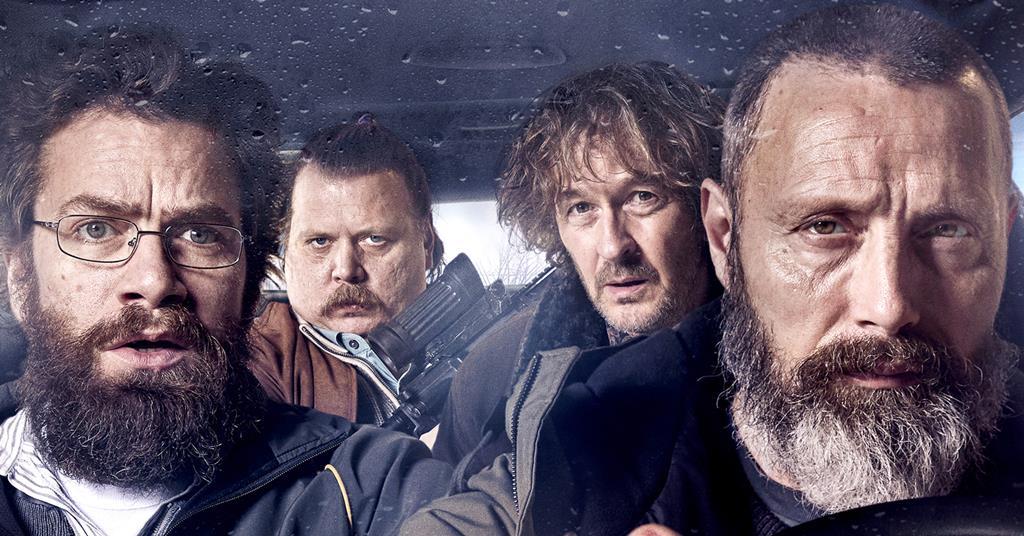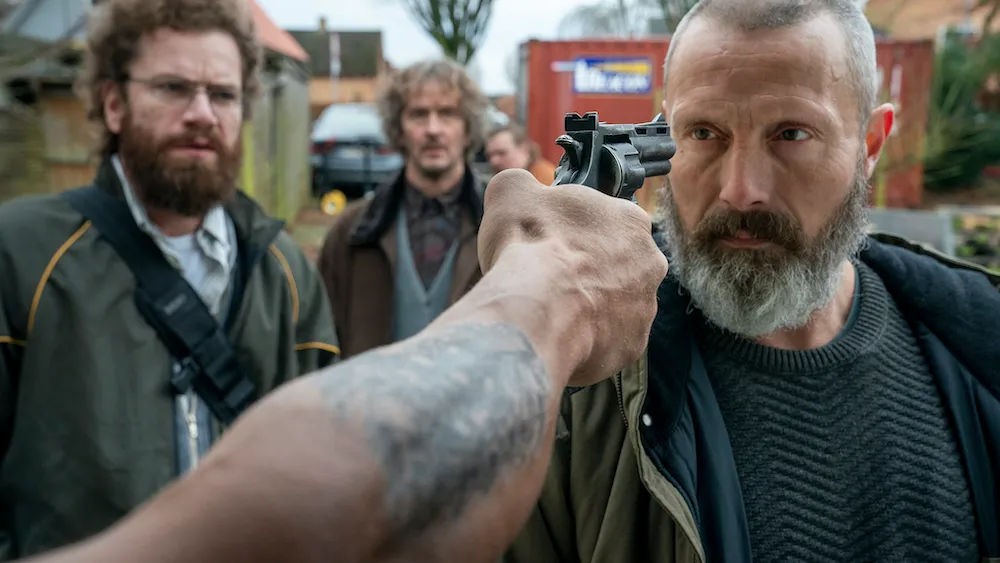When Anders Thomas Jensen hit 45 years of age the “Adam’s Apple” and “Men & Chicken” director said he had a “minor breakdown,” questioning the point of his life and desperately searching for meaning.

Channeling these feelings into the character of a military man with PTSD whose wife has just died in a train explosion that may not have been an accident was the start point of Jensen’s fifth feature as a director: a mid-life noir that straddles action, comedy and existential drama.
Monday night’s Rotterdam Film Festival opener, “Riders of Justice” treads that delicate line between farce and tragedy as solider Markus (Jensen regular Mads Mikkelsen), also father to teenager Mathilde, hooks up with three oddball maths geeks to determine the cause of the fatal crash.

Markus’ band of data analysts and hackers – more accustomed to breaking into computer systems to steal free gym memberships than tracing criminal biker gangs, soon become embroiled in a revenge plot, but on the journey end up becoming an unexpected source of support for each other.
Unlike the teenage girl in the film (played by newcomer Andrea Heick Gadeberg), who has hundreds of notes stuck to her wall that plot the trajectory which led to her mother’s death, Jensen’s wall is clear of Post Its.
A prolific screenwriter with over 60 credits to his name, and regular co-writer of fellow Dane Susanne Bier’s films, he adds that he only sticks script notes to walls on other people’s dramas.
“It’s funny I’m writing a film for director Nikolaj Arcel (‘Royal Affair’) – who helped me with the idea for ‘Riders’ – and we’re now doing this kind of wall with notes everywhere – but when I write for myself I never do that – I build it all in my head first for maybe six months and then write it all down.”
The director warns that over-structuring can lead to blandness.
“In a bid to make things tighter, there’s a danger of erasing both the nuances of character and the tone of the film in the script editing and editing process,” he says.
Jensen is helped along the way with a regular family of actors which include Mikkelsen; “The Killing’s” Nicolas Bro – who plays Emmenthaler, a pizza loving surveillance nerd with limited social skills; Lars Brygmann – the film’s fragile Lenart; and Nikolaj Lie Kass who plays Otto, a computer programmer who happens to be on the train with Markus’ wife and daughter when the accident happens.
“This was Mads’ first time playing a straight character in one of my films – he had to be straight for this mix of genres to work,” Jensen explains.
“Basically I had this idea of doing a Suanne Bier social realistic drama mixed in with one of my old films like “Adam’s Apple” – and I knew that Nikolaj’s character Otto would have to be the glue between the two worlds and Mads would have to be straight, almost realistic Sunday night TV character,” he says.
“But it was hard for him. We got two weeks into shooting and everyone else was having so much fun doing crazy stuff and Mads was standing there serving while everyone else was smashing the balls.”
While the director is often lauded as “the King of the Danish Action Comedy” he admits that shooting action on a feature with a budget of around five million Euros was challenging.
“We use animatics, we prepared so much in advance there is no room for playing around; you hope you get all your shots, because you need to use every single one; it’s really tough,” he says.
Like fellow Danish filmmakers Bier and Thomas Vinterberg, Jensen’s early success came out of his association with the Dogme 95 movement, which advocated minimalism in areas like sound and special effects, and a focus on script and character. This approach won Jensen the Oscar for 1998 short “Election Night.”
Many of his former Dogme 95 contemporaries have now moved onto TV series, most notably Bier with “The Undoing” and “The Night Manager,” but it’s not an area that appears to excite Jensen.
“I have a couple of projects and of course you can do a lot more with your characters and stories but I really like the idea that you buy a ticket, put on a jacket, get in a car and make an active choice to go and see a film,” he says.
“Riders” – which wrapped in March 2020, a few weeks before his country’s first lockdown – enjoyed a limited theatrical release in November before cinemas had to shut their doors again for a second time.
According to the film’s sales agent Trust Nordisk, 150,000 admissions, including pre-screenings, were sold on the opening weekend, making it last year’s greatest opening weekend in Danish cinema.
Further sales have been made internationally in the U.S. (Magnolia Pictures), the U.K. (Vertigo Releasing), France (SND), and a range of other territories, including Switzerland (Ascot Elite), Australia and New Zealand (Rialto), Japan (Klockworx), and Brazil (Synapse).
The film is also set to open in Russian cinemas on Feb. 18 (via Capella Film) and Jensen is passionate for it to be experienced on a big screen.
“There’s so much to gain in terms of the sense of the reaction from the rest of the audience: 18 to 25s see it as a complete comedy from beginning to end – even at the bits I didn’t think were funny – but then you see it with a middle-aged audience, and they read about a third of it as comedy and the rest as drama and it is very emotional for them – and you can only sense all of that in the cinema.”
So what would his previous Dogme 95 self made of the rise of the streamers and the opportunities presented by SVOD operators?
“There was an irony back then because Dogme films arrived in Denmark just as they were installing new THX sound systems in cinema outlets. Everything was so nice but in Denmark you could only see these shaky blurred Dogme films!
“I might get in trouble for saying so but I think Dogme 95 would have embraced streaming, because the focus was purely on the story and the characters.”
“Riders of Justice” is produced by Sisse Graum Jørgensen and Sidsel Hybschmann for Zentropa Entertainments3.
The film is co-produced by Film i Väst and Zentropa Sweden with support from Danish Film Institute/ Market Scheme, FilmFyn, Nordisk Film & TV Fond, The Media Programme of the European Union, in collaboration with YouSee, TV 2 Denmark, YLE and SVT.
